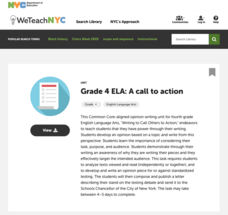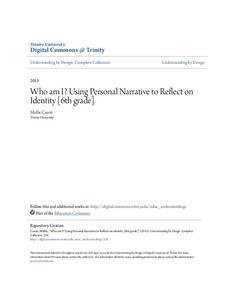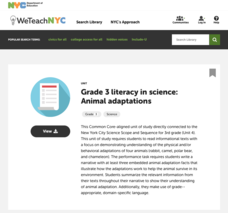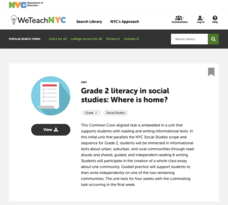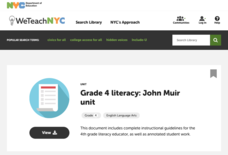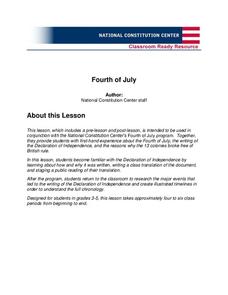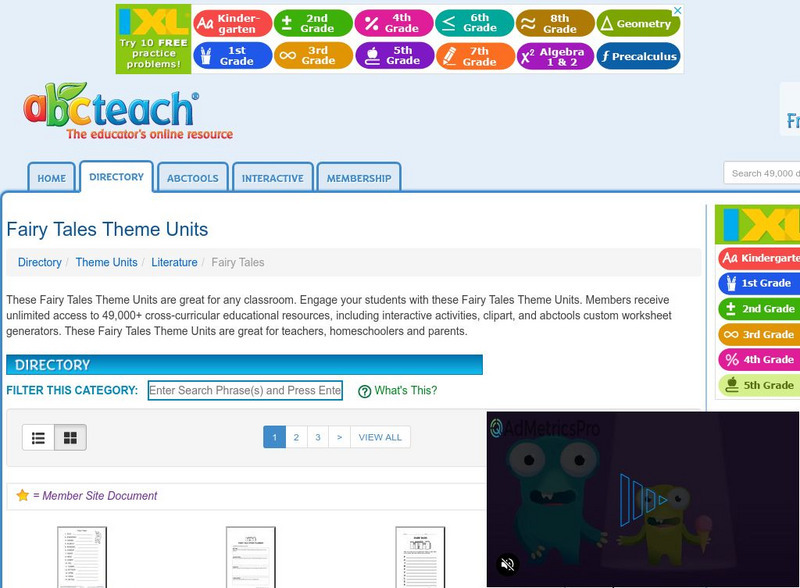Trinity University
Explain Yourself: An Expository Writing Unit for High School
Introduce expository writing with a unit that asks writers to craft an essay to explain a belief, value, or priority that is important to them. Mini-lessons within the unit focus on crafting thesis statements and conclusions, selecting...
New York City Department of Education
Grade 5 Literacy: TCRWP Nonfiction Reading and Opinion/Argument Writing
Choose a side! Pupils watch and read several nonfiction resources about zoos. After gathering their research, they choose a side either for or against closing zoos. Scholars complete KWL charts, anticipation guides, flow charts, and...
New York City Department of Education
Grade 4 Literacy in English Language Arts: A Call to Action
You have the power! Scholars learn that they have power of the pen in their writing. After reading and viewing various sources about standardized testing, they express their own opinions about the testing by writing letters to the...
Trinity University
Who Am I? Using Personal Narrative to Reflect on Identity
Who am I? Pupils work to answer this question through a unit that explores personal narratives and identity. Exit tickets for activities that examine different poems, short stories, and autobiographical writing serve as prewriting for...
New York City Department of Education
Grade 5 Literacy in English Language Arts: Should the School Day Be Longer?
Scholars read newspaper articles relating to a longer school day and complete note-taking organizers as they read. They then form opinions and complete outlines before writing essays supporting their point of view.
New York City Department of Education
Grade 11 Literacy in Social Studies: Research Paper
The lesson guides young academics through the steps in producing a 10-page research paper on any topic in American history. Historians begin by formulating a thesis and gathering resources, then move on to creating an outline, and end...
New York City Department of Education
Grade 3 Literacy in Science: Animal Adaptations
Third graders research and study animal adaptations and then use their findings to write narratives that include scientific criterion. This lesson is all about literacy and science! The lesson is completely designed for addressing Common...
New York City Department of Education
Grade 8 Science: Genetic Modification of Organisms
Genetic modification is a hot topic in the science and political world. A complete unit gives learners an opportunity to research genetic modification, play an interactive genetic engineering simulation, and interact with the information...
American Bar Association
News Literacy Model Curriculum in Social Studies
Scholars investigate news literacy in the twenty-first century. They use technology, legal decisions, writings, and digital privacy to analyze the topic. Using what they learned, a group assignment looks into both the challenges and...
New York City Department of Education
Grade 2 Literacy in Social Studies: Where Is Home?
What makes a community? How communities differ? Young scholars research different types of communities, small rural towns, and large crowded cities. They respond to writing prompts, and write essays in groups to understand the wide...
New York City Department of Education
Grade 3 Literacy: Investigating Sharks
Shark! Scholars read about sharks in Facts about Sharks by Susanna Batchelor. They then pretend they are shark scientists and choose a shark they want to study. Learners research their sharks and record information in graphic organizers...
New York City Department of Education
Grade 4 Literacy: John Muir Unit
Learn how to correctly analyze and score a written performance task. Example work shows annotated think alouds for grading. Teachers also have access to graphic organizers for helping writers succeed,
New York City Department of Education
Straw Rockets
Scholars become rocket scientists as they take off on a journey exploring Newton's laws of motion. After learning the laws of motion, pupils design their own investigations using straw rockets. They highlight their literacy skills in a...
National Constitution Center
Fourth of July (Grades 3-5)
Bring history to life for your young scholars with a Fourth of July lesson series. After a class reading of the Declaration of Independence, students translate this pivotal document into layman's terms before working in small...
Crabtree Publishing
Why Does Media Literacy Matter?
Criticism of news and entertainment journalism is at an all-time high. Help 21st-century learners develop the media literacy skills they need to become critical consumers with a three-lesson guide the looks at persuasive techniques used...
Curated OER
Sophocles' Oedipus the King
Introduce your class to the Greek tragedy with a study of Sophocles’ Oedipus the King. Learners examine the features of a Greek tragedy, Sophocles’ achievements and contributions, and the universal themes that make the drama an...
Penguin Books
The Curriculum Guide for The Secret Hum of a Daisy by Tracy Holczer
The death of a parent can turn a child's world upside down. A curriculum guide for The Secret Hum of a Daisy explores defining moments in the main character's life, including the loss of her mother. Chapter-by-chapter discussion...
TES Global
Tes: Prose: Short Stories
[Free Registration/Login Required] In this downloadable learning module, students will write a short story. Students will refer to the grading rubric to help them self-assess their writings. Students will revise and edit
TES Global
Tes: The Tempest Sow
[Free Registration/Login Required] This is a comprehensive lesson plan for teaching Shakespeare's The Tempest including worksheets, excerpts from the text in original and modern versions, and writing assignments with rubrics.
abcteach
Abcteach: Fairy Tale Printouts: Abc teach.com
[Free Registration/Login Required] This fairy tale resource features activities, bar graphs, word searches, crossword puzzles and more. Teachers can print out many of these materials quickly and easily.


